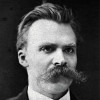“ The noble man honours in himself the powerful one, him also who has power over himself, who knows how to speak and how to keep silence, who takes pleasure in subjecting himself to severity and hardness, and has reverence for all that is severe and hard. ”
Friedrich Nietzsche, Beyond Good and Evil (1886). copy citation
| Author | Friedrich Nietzsche |
|---|---|
| Source | Beyond Good and Evil |
| Topic | hardness silence |
| Date | 1886 |
| Language | English |
| Reference | |
| Note | Translated by Helen Zimmern |
| Weblink | http://www.gutenberg.org/files/4363/4363-h/4363-h.htm |
Context
“In the foreground there is the feeling of plenitude, of power, which seeks to overflow, the happiness of high tension, the consciousness of a wealth which would fain give and bestow:—the noble man also helps the unfortunate, but not—or scarcely—out of pity, but rather from an impulse generated by the super-abundance of power. The noble man honours in himself the powerful one, him also who has power over himself, who knows how to speak and how to keep silence, who takes pleasure in subjecting himself to severity and hardness, and has reverence for all that is severe and hard. "Wotan placed a hard heart in my breast," says an old Scandinavian Saga: it is thus rightly expressed from the soul of a proud Viking. Such a type of man is even proud of not being made for sympathy;”
source


